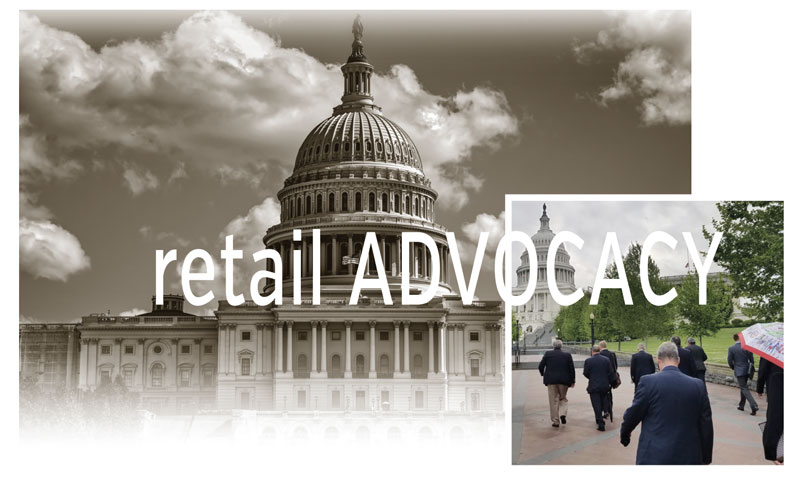A Government Relations Update for the Home Furnishings Industry
As home furnishings retailers face growing challenges from legislative shifts, executive orders, and trade
policies,
they are making contingency plans on a company-by-company level. However, many are unaware that they can
influence
decisions shaping their future by staying informed, engaging in advocacy, and leveraging HFA’s resources.
Why Engagement is Crucial
“This isn’t about politics—it’s about ensuring your voice is heard,” says Shannon Williams, HFA's CEO.
“Legislation
directly affects your business. Our industry needs to be at the table when decisions are made.”
The Home Furnishings Association (HFA) is the industry’s trusted source for timely and actionable insights,
ensuring
furniture retailers are prepared for what’s ahead. Recent updates on tariffs, manufacturing strategies,
workforce
development, and economic policies signal significant transformations in our industry that retailers cannot
afford to
overlook.
"The administration’s intent is to drive manufacturing back to the U.S. While this goal is ambitious, it
presents
substantial challenges, including workforce capacity and readiness."
Real-Time Information to Mitigate Risks
Trade policies have always impacted home furnishings retailers, and the recent flurry of tariff activity
suggests
continued volatility. Although the president claims that new tariffs will “correct longstanding imbalances in
international trade” and bring manufacturing jobs back to the United States, implementing them also comes with
significant risks for retailers and manufacturers.
HFA members are assessing how these potential cost increases will affect their supply chains, pricing, and
margins. At
the same time, HFA’s Government Relations Action Team (GRAT), alongside HFA lobbyists in Washington, D.C., Chris
Andresen and Bill Simmons, are tracking these developments, ensuring members have access to real-time
information and
strategies to mitigate risks.
Restoring U.S. Furniture Manufacturing?
The administration’s intent is to drive manufacturing back to the U.S. While this goal is ambitious, it presents
substantial challenges, including workforce capacity and readiness. Our industry must consider whether its focus
will be
on automated manufacturing as a long-term solution or if efforts will be made to upskill the current workforce
to meet
new demands.
While bringing manufacturing stateside could offer long-term stability, retailers must anticipate potential
supply chain
disruptions and labor shortages in the transition. HFA continues to engage policymakers and industry leaders to
advocate
for pragmatic approaches that balance economic growth with retail viability.
Inflation, Consumer Spending & Market Shifts
The correlation between tariffs and inflation remains a pressing concern, especially in the home furnishings
business.
Some economists and analysts warn that continued upward inflationary pressures in the economy that exclude the
impacts
of potential tariffs combined with ongoing policy uncertainty mean that the Fed could continue to pause rate
reductions
this year.
Andresen notes that furniture retail faces higher inflation rates than reported averages. Higher costs of goods
will
lead to price adjustments that impact consumer purchasing power, potentially slowing demand for housing and home
furnishings. Retailers must prepare for potential cost fluctuations and find strategies to maintain
profitability while
keeping products affordable for their customers.
To help retailers proactively develop pricing and marketing strategies that maintain competitiveness without
eroding
profitability, HFA provides regular economic updates to help members make informed decisions in response to
market
fluctuations.
Each Voice Matters
With tax reform, trade policies and industry regulations in flux, advocacy has never been more critical. A slim
majority
in Congress means every vote has the potential to shape policies that impact retailers’ bottom lines. Engaging
with
lawmakers is not just an opportunity—it’s a necessity.
The HFA Government Relations Action Team (GRAT) meets bi-weekly with the HFA lobbyists to discuss legislative
changes
and formulate strategies for retailer engagement.
How To Take Action
The Fly-In Event: HFA is organizing a Washington, D.C. fly-in event from May 14 to 16, 2025, to provide
retailers with a
platform to educate legislators on the industry’s challenges and priorities.
This is an opportunity for retailers to meet with policymakers and advocate for policies supporting retail home
furnishings. If you are interested in attending, contact Shannon Williams, HFA CEO, at swilliams@hfa.org.
GRAT Calls: Bi-weekly strategy sessions allow retailers to stay abreast of legislative
developments and stay engaged. To
get involved, contact Shannon Williams at swilliams@hfa.org.

About HFA:
HFA is a trade organization dedicated to serving furniture retailers. Our mission of service is built on
Community, Advocacy, Resources, and Education to support retailer interests and the success of the home
furnishings
industry. HFA provides members with programs, resources, services, and a unified voice in government
relations. For more
information about HFA and its programs, visit
www.myhfa.org.